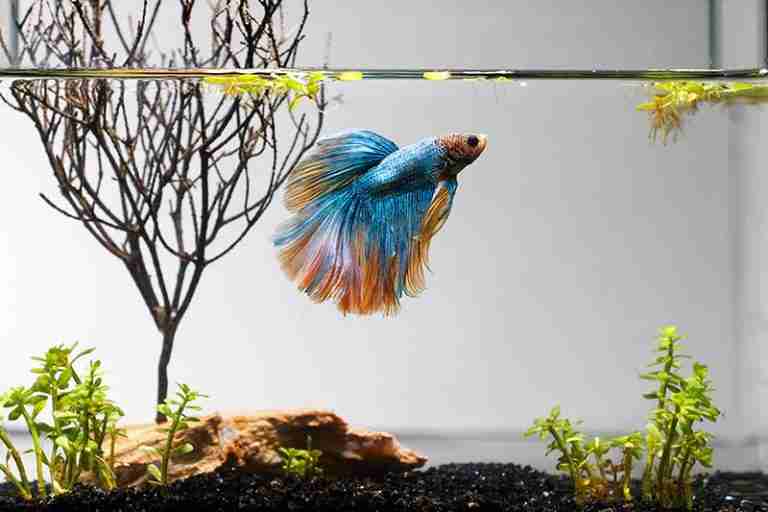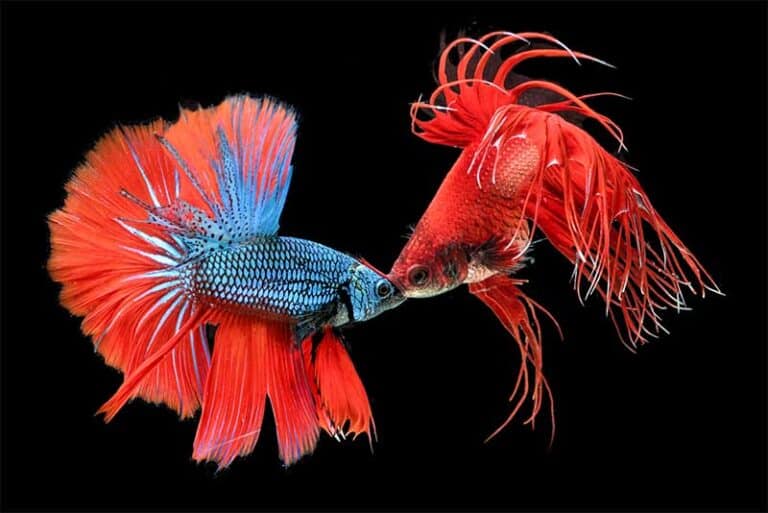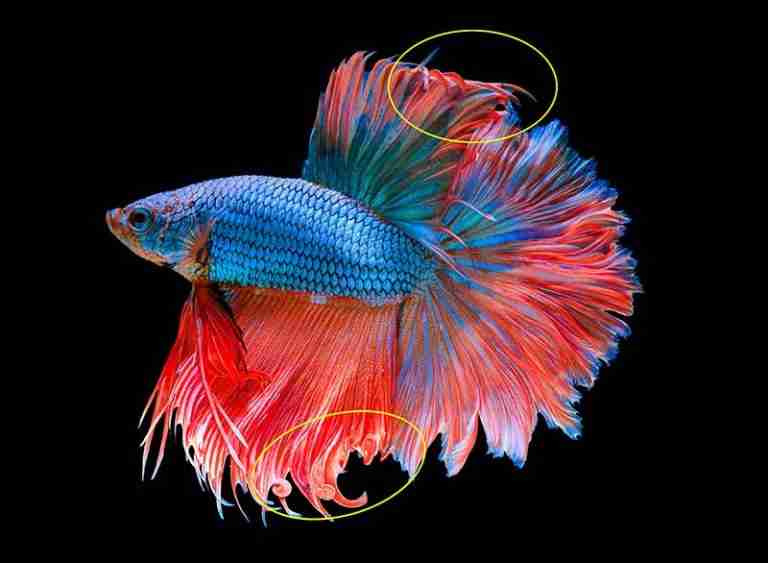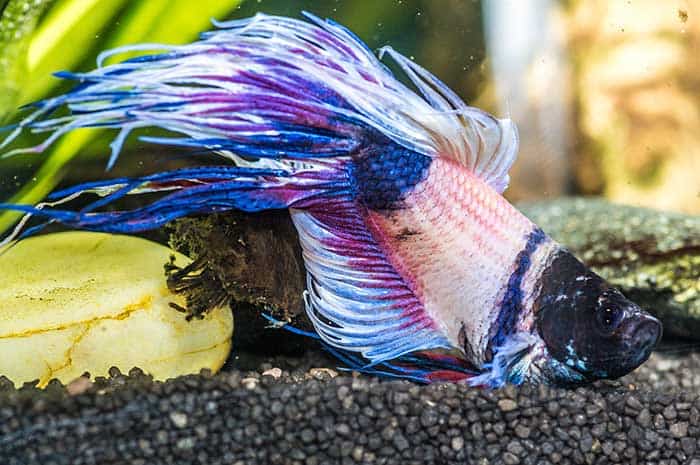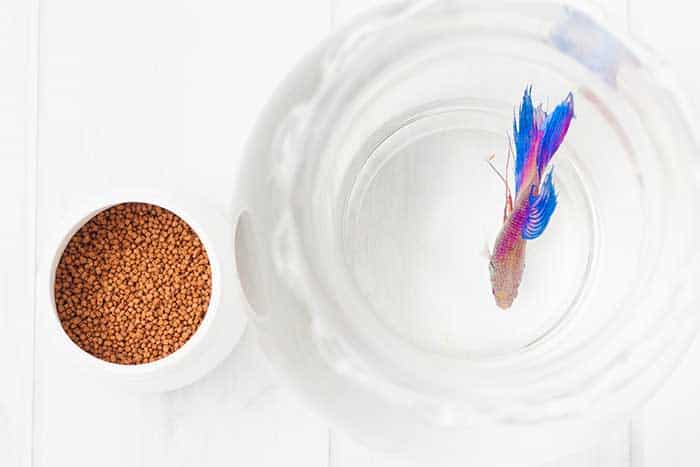How Long Do Betta Fish Live (The Betta Fish Lifespan)
How long do betta fish live? As a betta owner, it’s something you should know, and it’s also a topic of much debate. Some people say that bettas live for up to five years, while others say that they only live for two or three. So, what is the truth, how long do betta fish live?
Betta fish typically live between 2 and 5 years, although they have been reported to live until 10 years of age in captivity. Many factors come into play when looking at a betta’s lifespan, but it is uncommon for them to have a life expectancy beyond 7-8 years.

It is helpful to ask your betta’s age when you purchase at a pet store, as they are usually 6-12 months old when sold. If you know your betta’s approximate birthday, you can better anticipate their demise.
In this short article, we will explore the life span of betta fish and find out how long they really do live. I will also provide some useful tips on keeping your betta fish healthy!
Betta Fish Lifespan In The Wild & Captivity
The average life expectancy of a betta fish can almost double depending on whether they live in the wild or in captivity.
You may be surprised to learn that betta fish will often live longer in captivity, and there are many good reasons for this.
How Long Do Betta Fish Live In The Wild
In the wild, betta fish only live for two years on average due to the many dangers they face, such as predators, diseases, and a lack of food.
The natural habitat of betta fish can be quite harsh. Murky water, sometimes with very little to eat, and the constant risk from predators can make survival much harder.
Betta fish are also very aggressive toward their own species, which is why they are also called Siamese fighting fish. Combat between bettas will often become fatal due to injuries sustained and infections setting in. Betta fish also fight any fish that invade their territory.
It’s no wonder that the betta’s life span is so short in the wild!
You can learn more about betta fighting in my article: Why do betta fish fight.
How Long Do Betta Fish Live As Pets
As pets, betta fish typically live around three to five years, and sometimes even longer. The main reason for this difference is that bettas in captivity do not have to worry about predators, diseases, or other aggressive betta fish, and they are usually well-fed.
When kept as pets, you need to provide your betta fish with a suitably sized tank and a healthy diet. You should also keep a close watch for the onset of illness and diseases.
Although betta fish can join a community tank, pet betta fish are usually better off away from other fish. You also shouldn’t add other betta fish to the same tank unless you want a fight to start between these fighting fish.
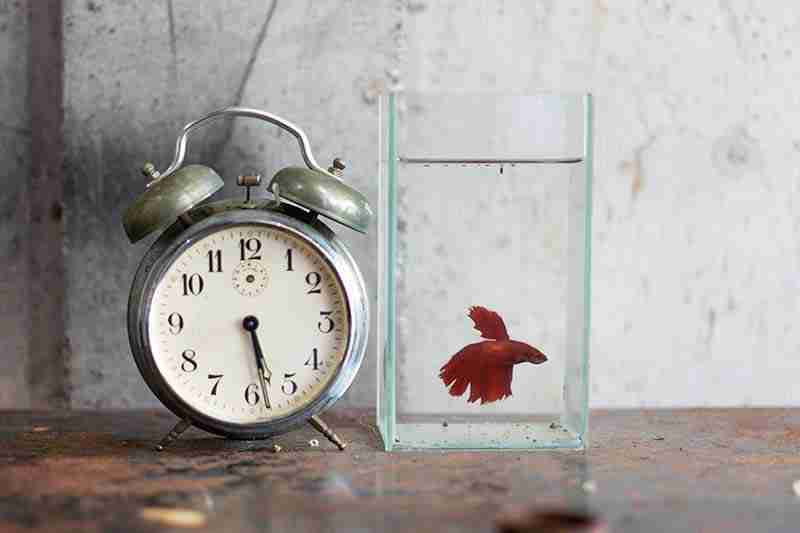
The only times you should have more than one betta in a tank is if you are breeding or you have a betta sorority tank. A betta sorority is when you keep several females, which is possible because there are less aggressive than their male counterparts. Even sorority tanks are difficult to keep, and you need plenty of space for them to work.
If you decide you want to mix your betta with other fish, you should research which species are most compatible and hope that fighting doesn’t occur. Young betta fish are often better introduced to a community tank as they aren’t sexually mature and, therefore, less territorial or aggressive.
For advice on providing the best possible care, you can read my guides on betta fish care, setting up a betta tank, and why won’t my betta fish eat.
If you are concerned that your betta fish may get lonely, you should read my article: Do Betta Fish Get Lonely Or Bored?
Betta Fish Food For A Healthy Diet
Betta fish have specific dietary requirements. They are omnivores, which means they eat both plants and animals. Their diet consists of small insects, crustaceans, and zooplankton in the wild.
As pets, you can feed these tropical freshwater fish various foods such as pellets, flakes, live food, frozen food, and vegetables. I recommend using a mix of all these different types.
Some favorite foods for betta fish are:
- Brine shrimp
- Daphnia
- Bloodworms
It would be best if you also offered them a variety of vegetables such as:
- Zucchini
- Cucumber
- Lettuce
Although betta fish can go without food for quite some time, they do love to eat, and they often beg for food even when they are not hungry. You should only feed them whatever they can consume in two minutes, twice a day.
Overfeeding your betta fish can lead to health problems such as swim bladder disease and obesity, so it is essential to stick to this feeding schedule.
You can find a variety of fish food at pet stores locally or online.
How Long Do Betta Fish Live In A 1 Gallon Tank
It is unlikely that a betta fish will live longer than 1-2 years in a 1 gallon tank. Many people wrongly believe that bettas do not need much space and live happily in a tiny fish bowl their whole life, but this is not the case.
Betta fish can be pretty active and need space to swim around and explore. A 1 gallon tank is too small for a betta fish to get enough exercise, causing them stress, which can lead to a shortened lifespan. Betta fish grow mostly in their first year, and a tank this small can stunt their growth.
Keeping a 1 gallon tank clean is challenging, and the small space will be sensitive to outside temperature fluctuations. Small bodies of water react quickly to a build-up of waste, throwing off the water parameters such as the pH, ammonia levels, and nitrite levels, causing further stress to your betta.
Fitting a heater or filter to a 1 gallon betta fish tank is not usually possible, although some aquariums have them built into the housing.

If you want to help your betta fish live longer, I recommend a tank size between 5 and 10 gallons which will solve all of the issues above and provides enough space to add some plants and ornaments. Betta’s love to hide away when stressed or sleeping, so they will appreciate these additions.
Plants also benefit by helping to oxygenate your tank while removing nitrates and other chemicals.
I have written a guide about choosing the best size betta tank: How Big Should A Betta Fish Tank Be (The ultimate guide).
Signs Of A Healthy Betta Fish
It’s always good to see your betta fish looking healthy, as it lets you know that you are doing things right and that they are likely going to live longer.
So what are the signs of a healthy betta fish?
- Vibrant colors – Betta fish have some of the most beautiful fins out of all freshwater tropical fish, and those bright, vibrant colors are a definite sign of good health.
- Fins that are not shredded – If your betta’s fins look a little tattered, it could be a sign of fin rot, a common disease in bettas.
- A healthy appetite – A good appetite is another sign that your betta fish is in good health and feeling comfortable in their environment.
- Clear eyes – Betta’s eyes should be clear and not cloudy. If your betta’s eyes look a little cloudy, it could be a sign of an infection.
- Active swimming – Betta fish are known for their beautiful fins, but they are also excellent swimmers! If your betta is constantly swimming around their tank, it’s a good sign.
- Breathing normally – You will be able to see your betta’s gills moving as they breathe, and it should look smooth and not labored. If your betta is gasping for air, it’s a sign that something is wrong.
- Building a betta bubble nest – Betta fish are known for building bubble nests when they are ready to attract a mate, and this is another sign that they are happy and content in their surroundings.
If you notice any of the above signs, it’s a good indication that your betta fish is healthy and happy. If you are concerned about your betta’s health, please consult a veterinarian who can give you more specific advice.
If you change your betta tank water frequently, provide a healthy diet, and plenty of exercise, your betta fish should be happy and healthy.
You can read more about cleaning your betta tank and changing the water in the articles below:
How To Clean a Betta Fish Tank And How Often.
How Often To Change Betta Water – What you need to know.
Why Do Betta Fish Die Suddenly
Throughout their life cycle, betta fish are prone to several serious illnesses that can cause them to die suddenly. However, when illness is caught in time, you can often provide treatments successfully.
Some illnesses that you need to look out for are:
- Fin Rot – Betta fin rot is a bacterial infection that causes the fins and tail to rot away. Fin rot is often caused by dirty water and can be treated with antibiotics.
- Dropsy – Dropsy is a condition that causes the betta’s scales to stick out and can be fatal if left untreated. Dropsy is often caused by poor water quality or an infection and can be treated with antibiotics.
- Ich (White Spot) – Ich is a parasitic infection that causes white spots on a betta’s body. You can treat ich with various medications, but it is vital to catch it early.
- Swim Bladder Disease – Betta Swim bladder disease is a condition that prevents the betta from being able to swim correctly. Various things, including constipation, can cause swim bladder disease, and it can be treated with medication.
While these are some of the more common illnesses that can cause bettas to die suddenly, many other conditions can also be fatal.
There are often several symptoms that can indicate the onset of an illness, stress, and other health issues. The sooner you can identify a problem with your betta, the sooner you can fix it.
Some symptoms that can sometimes indicate poor health are:
- Fin curling or clamping – If you notice your betta fins clamped, or curling, it can sometimes be a sign of poor water quality, stress, or fin damage.
- Torn fins – If your betta fish has torn fins, this can also be caused by your betta fish rubbing against rocks or other sharp objects when parasites are present.
- Loss of appetite – A loss of appetite can sometimes be a sign of illness, stress, or constipation in betta fish.
- Floating upside down – If your betta starts floating upside down, it is often a sign of swim bladder disease.
- Sitting at the bottom of the tank – If your betta starts sitting at the bottom of its tank, it can sometimes be a sign of depression or illness.
- Betta Fish Swimming at the top of the tank – Although betta fish are able to take oxygen from above the surface, if your tank’s oxygen levels are completely normal, swimming at the surface may indicate that your betta is struggling to absorb the dissolved oxygen which is available to them.
- Stress stripes – Betta stress stripes are dark lines that run vertically along the betta’s body. Stress stripes can be a sign of stress or illness.
- A Bad Mood – If your betta is under the weather, it may show signs of stress, or your betta may appear angry. An angry betta fish will usually dart around the tank flaring its fins and gills.
If you notice any changes in your betta’s behavior or appearance, please consult a veterinarian as soon as possible. Betta fish are beautiful creatures that can bring a lot of
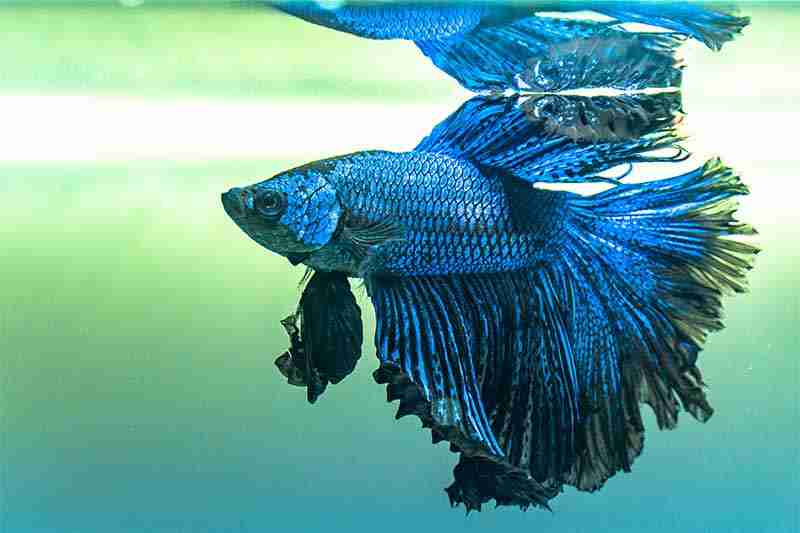
Betta Fish Behavior Before Death
Whether your betta fish is dying of old age or has been suffering from a severe illness, you will typically see a change in your betta’s behavior before death.
Some of the most common changes in behavior are:
- Increased lethargy – If your betta fish is suddenly spending more time at the bottom of the tank and appears to be less active, or you notice your betta sleeping more often, it may be a sign that death is near.
- Loss of appetite – A loss of appetite is often one of the first signs of something wrong with your betta fish.
- Hiding – If your betta fish starts hiding more often, it may signify that it is not feeling well.
- Color fading – It is common to witness vibrant colors fade from a dying betta fish.
- Changes in swimming – If your betta fish’s swimming becomes erratic or has difficulty swimming, it may signify that death is near.
Many of the signs above can also show the onset of illness, but if your betta is old or you have recently treated your betta for disease, these signs suggest that your betta is close to death.
Keep your betta comfortable in a warm, clean tank and provide small amounts of food in case it is ready to eat, but not so much that it will rot and upset the water parameters.
If you feel your betta fish is suffering, you can euthanize your betta fish to save further pain and suffering. If euthanasia is something you would like to consider, you can find out more in my article: How To Euthanize A Betta Fish.
Tips To Help Your Betta Live Longer
Throughout this article, I have covered most of what can reduce your betta’s lifespan and what your betta fish needs for a healthy life. This section provides a few extra tips and expands on a few areas already discussed.
- Provide your betta with some live food – Betta fish love to hunt for their food, and it gives them plenty of exercise, which also relieves stress.
- Add some toys to your betta tank – The best betta toys are usually mirrors, betta balls, and hoops. Using these toys will also provide exercise, and they will keep boredom at bay.
- Fast your betta for 1 or 2 days a week – Withholding food from your betta fish for 1 or 2 days does wonders for their digestion, and it keeps them from becoming fat and unhealthy. An overfed betta fish won’t live as long.
- Get to know your betta fish – The more you become friends with your betta, the quicker you’ll notice if they become sick, helping you provide the best treatments in a timely manner.
- Clean your betta fish tank regularly – Healthy water conditions enable your fish to remain healthy and live much longer.
That’s it! Just follow the few extra tips above, and your betta fish will be living a life of luxury. I mentioned that you should bond with your betta fish, but be aware that It becomes very easy to overfeed your fish out of kindness or sympathy. Overfeeding can lead to all sorts of health problems and poor water conditions, so avoid the urge.
Wrap Up
Although betta fish have some little quirks in their care needs, it is generally easy to keep healthy fish that can enjoy a long life. Clean water and a good diet provide the best living conditions that are essential to all fish, and betta fish are no different.
A small tank is not suitable for a betta fish, drastically lowering its potential life expectancy, so opt for a bigger tank. You could consider a 5 gallon tank which is still a relatively small tank but suitable for a single betta.
Keep your betta in separate tanks to avoid fighting. If you want to add your betta to a community tank, you need a large tank with plenty of room and hiding spots to avoid confrontations.
Keep an eye on your betta’s general health to catch illness early and provide treatments quickly.
With care and attention, your betta fish should enjoy a long and happy life.


